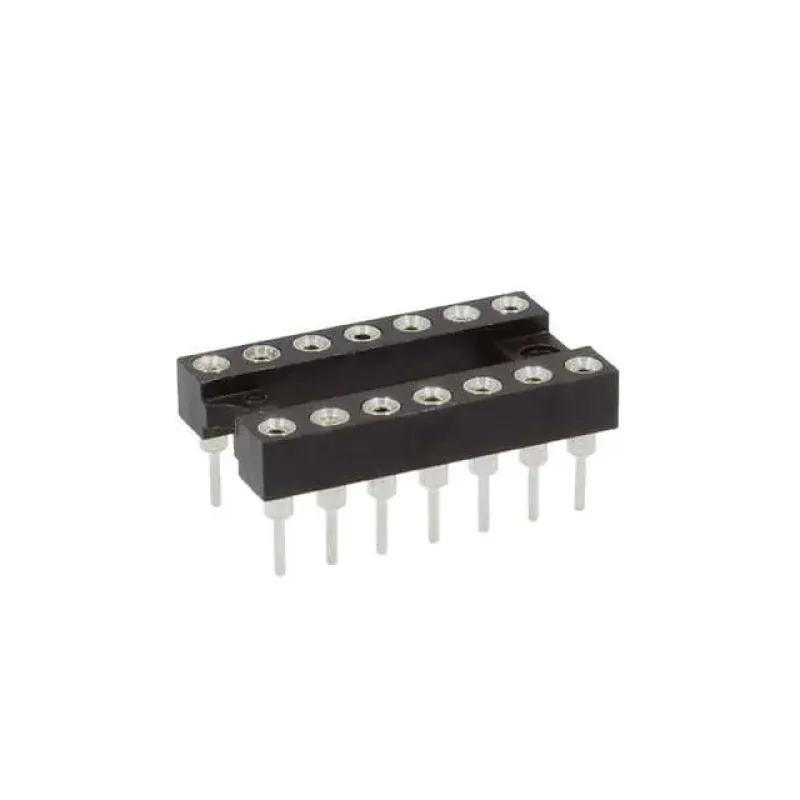
- Stock: Out of Stock
- Model: ICCXXX.DIP14PP
2x7 Precision IC Socket with 14 Pins in DIP-14 Format
Precision IC sockets are top-tier connectors engineered for the purpose of accurately and reliably mounting integrated circuits (ICs) onto printed circuit boards (PCBs). Their application is particularly beneficial in scenarios where precision, durability, and consistent performance are paramount. They find extensive use in high-end electronic devices, as well as in prototyping and testing environments.
Key Features:
- High Precision: These sockets are produced with strict tolerances to guarantee precise pin alignment and dependable connections.
- Durability: Constructed from superior quality materials, these sockets offer excellent mechanical strength and longevity.
- Low Contact Resistance: This feature ensures minimal signal loss and reliable electrical connections.
- Ease of Use: The design allows for effortless insertion and removal of ICs, making replacements and upgrades quick and easy.
- Gold-Plated Contacts: Many models feature gold-plated contacts for enhanced conductivity and corrosion resistance.
Types of Precision IC Sockets:
- DIP (Dual In-Line Package) Precision Sockets: These sockets are designed for ICs with two parallel rows of pins. They are commonly used in high-precision applications and prototyping, with common pin counts including 8, 14, 16, 20, 24, 28, 40, and so on.
- PLCC (Plastic Leaded Chip Carrier) Precision Sockets: These are designed for PLCC IC packages with leads on all four sides. They are used in applications requiring high pin counts and precision, with common pin counts including 20, 28, 32, 44, 52, 68, and so on.
- PGA (Pin Grid Array) Precision Sockets: These sockets are for ICs with an array of pins arranged in a grid pattern. They are common in high-performance CPUs and other high-density ICs.
- ZIF (Zero Insertion Force) Precision Sockets: These sockets allow ICs to be inserted and removed without any insertion force. A lever or cam mechanism secures the IC. They are ideal for testing and programming where frequent IC changes are required.
Advantages of Using Precision IC Sockets:
- Accurate Alignment: They ensure precise alignment of IC pins, reducing the risk of bent or misaligned pins.
- Reliable Connections: They provide consistent and reliable electrical connections with low contact resistance.
- Enhanced Durability: They are built to withstand repeated insertions and removals without degrading performance.
- Corrosion Resistance: Gold-plated contacts resist oxidation and corrosion, maintaining good electrical conductivity over time.
- Prototyping Flexibility: They are essential for development and prototyping environments where ICs need frequent replacement.
Disadvantages:
- Higher Cost: Precision IC sockets are more expensive than standard IC sockets due to their superior quality and manufacturing precision.
- Increased Height: They add height to the PCB, which may be a concern in compact designs.
Applications:
- High-End Electronics: They are used in high-performance electronic devices where reliability and precision are paramount.
- Prototyping and Development: They are essential in environments where ICs are frequently changed during the design and testing phases.
- Testing and Programming: ZIF precision sockets are particularly useful for IC testing and programming.
- Repair and Maintenance: They facilitate easy replacement of faulty ICs in high-precision electronic equipment.
- Military and Aerospace: They are often used in critical applications requiring high reliability and durability.
Example Circuit:
- Components:
- Precision IC socket (e.g., DIP, PLCC, PGA)
- IC (e.g., microcontroller, memory chip)
- PCB
- Power supply
- Circuit Description:
- Mount the Socket: Solder the precision IC socket onto the PCB, ensuring all pins are properly aligned and soldered.
- Insert the IC: Carefully insert the IC into the socket, ensuring all pins are correctly aligned.
- Connect Power Supply: Connect the power supply to the circuit as required by the IC specifications.
- Test the Circuit: Power on the circuit and test the functionality of the IC to ensure proper operation.
Conclusion:
Precision IC sockets are vital components for high-performance and high-reliability electronic applications. Their ability to provide accurate alignment, reliable connections, and enhanced durability makes them a preferred choice in prototyping, testing, and critical electronic devices. Despite their higher cost, the benefits they offer in terms of performance and reliability often outweigh the disadvantages.
Package Includes:
1 x Precision IC Socket 2x7















